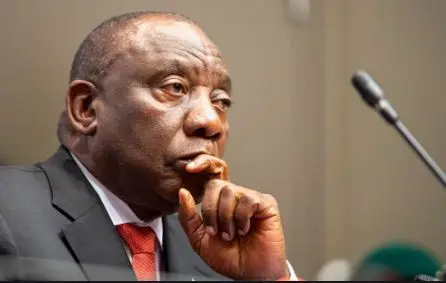
South African President Cyril Ramaphosa faces significant challenges following the African National Congress (ANC) party’s poor performance in the recent elections, marking its worst result since the end of apartheid.
With approximately 71% of polling stations reporting, the ANC’s vote share dropped sharply to less than 42%, a significant decline from the 57.5% it achieved in the 2019 election and falling short of a majority for the first time in 30 years.
This electoral setback necessitates that the ANC, once the liberation movement of Nelson Mandela, engage in coalition negotiations or other agreements with smaller parties to govern the country. Such arrangements may require policy concessions or the relinquishing of prominent cabinet positions.
Ramaphosa, a former union leader turned businessman, may face calls to resign from opposition parties and critics within his deeply divided party. However, a top ANC official has expressed support for him to remain in office, and analysts note the absence of an obvious successor.
Anthony Butler, a politics professor at the University of Cape Town, emphasized the lack of a clear consensus candidate to replace Ramaphosa.
Despite challenges, Ramaphosa maintains high approval ratings among major politicians, as evidenced by a March opinion poll. Factional conflicts within the ANC could complicate efforts to challenge his leadership.
Ramaphosa has yet to comment on the ANC’s election performance. His spokesperson indicated that he would address the matter on Sunday, coinciding with the announcement of full provisional results.
Ramaphosa’s tenure as president has previously been tested, notably in 2022 when a panel report suggested misconduct regarding cash discovered at his game farm, known as the “Farmgate” scandal. Despite this, he denied any wrongdoing and secured a new five-year term as ANC leader.
The recent election was anticipated as a stern test for the ANC due to public discontent over issues such as high unemployment, crime rates, and persistent power outages.
Ramaphosa ascended to the leadership of the ANC in late 2017 with promises to reform the party’s tarnished reputation and revive the economy following years of scandal, corruption, and economic decline during Jacob Zuma’s presidency.
However, the initial optimism surrounding his presidency waned soon after he assumed office in 2018.
Despite more than six years in power, the economy remains stagnant, and controversies continue to plague senior ANC figures.
The recent electoral setback was dealt by Ramaphosa’s longtime rival, Jacob Zuma, who threw his support behind the new party uMkhonto we Sizwe, surpassing expectations and significantly eroding ANC support, particularly in Zuma’s stronghold of KwaZulu-Natal (KZN).
“Jacob Zuma outmaneuvered Ramaphosa and the ANC. He recognized their vulnerability in KZN,” remarked political analyst Ralph Mathekga. “This spells the end of Ramaphosa’s agenda… Losing elections cannot be overlooked.”
Ramaphosa has faced criticism for hesitating on crucial reforms, seemingly to avoid exacerbating divisions within the ANC, a departure from his decisive stance as a union leader in the 1980s.
However, his supporters praise his ability to build consensus and his efforts to elevate South Africa’s profile as a proponent of the “Global South,” advocating for fairer vaccine distribution during the COVID-19 pandemic.
More recently, South Africa filed a genocide case against Israel at the International Court of Justice, leading to a ruling that Israel must halt its military offensive in the Gaza city of Rafah. Israel has vehemently denied the accusations and continued its assault.
On the campaign trail, Ramaphosa highlighted the ANC’s achievements over the past three decades, but critics argue that he has offered few new solutions to South Africa’s pressing challenges.
During the ANC’s final campaign rally, Ramaphosa pledged to “do better” before a large crowd of supporters in a Soweto soccer stadium, yet many left before he concluded his speech.
